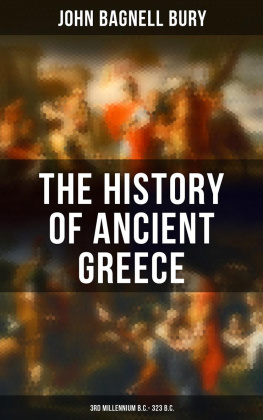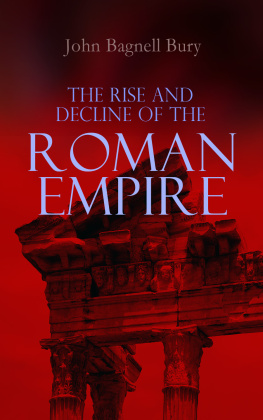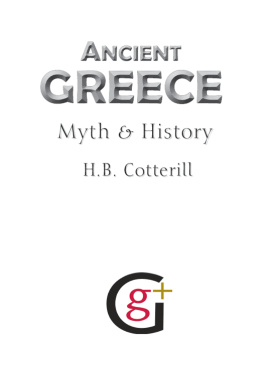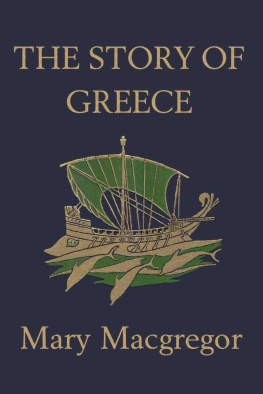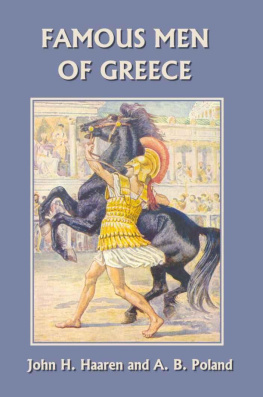Greece and the Aegean
The rivers and valleys, the mountains, bays, and islands of Greece will become familiar, as our story unfolds itself, and we need not enter here into any minute description. But it is useful at the very outset to grasp some general features which went to make the history of the Greeks what it was, and what otherwise it could not have been. The character of their history is so intimately connected with the character of their dwelling-places that we cannot conceive it apart from their land and seas.
Of Spain, Italy, and Illyricum, the three massy promontories of which southern Europe consists, Illyricum in the east would have closely resembled Spain in the west, if it had stopped short at the north of Thessaly and if its offshoot Greece had been sunk beneath the waters. It would then have been no more than a huge block of solid land, at one corner almost touching the shores of Asia, as Spain almost touches the shores of Africa. But Greece, its southern continuation, has totally different natural features, which distinguish it alike from Spain the solid square and Italy the solid wedge, and make the eastern basin of the Mediterranean strikingly unlike the western. Greece gives the impression of a group of nesses and islands. Yet in truth it might have been as solid and unbroken a block of continent, on its own smaller scale, as the massive promontory from which it juts. Greece may be described as a mountainous headland broken across the middle into two parts by a huge rift, and with its whole eastern side split into fragments. We can trace the ribs of the framework, which a convulsion of nature bent and shivered, for the service, as it turned out, of the human race. The mountains which form Thessalys eastern barrier, Olympus, Ossa, and Pelion; the mountains of the long island of Euboea; and the string of islands which seem to hang to Euboea as a sort of tail, should have formed a perpetual mountainous chainthe rocky eastern coast of a solid promontory. Again, the ridges of Pindus which divide Thessaly from Epirus find their prolongation in the heights of Tymphrestus and Corax, and then, in an oblique south-eastward line, deflected from its natural direction, the chain is continued in Parnassus, Helicon, and Cithaeron, in the hills of Attica, and in the islands which would be part of Attica, if Attica had not dipped beneath the waters. In the same way the mountains of the Peloponnesus are a continuation of the mountains of Epirus. Thus restoring the framework in our imagination and raising the dry-land from the sea, we reconstruct, as the Greece that might have been, a lozenge of land, ribbed with chains of hills stretching south-eastward far out into the Aegean. If nature had given the Greeks a land like this, their history would have been entirely changed; and by imagining it we are helped to understand how much they owed to the accidents of nature. In a land of capes and deep bays and islands it was determined that waterways should be the ways of their expansion. They were driven as it were into the arms of the sea.
The most striking feature of continental Greece is the deep gulf which has cleft it asunder into two parts. The southern half ought to have been an islandas its Greek name, the island of Pelops, suggestsbut it holds on to the continent by a narrow bridge of land at the eastern extremity of the great cleft. Now this physical feature had the utmost significance for the history of Greece; and its significance may be viewed in three ways, if we consider the existence of the dividing gulf, the existence of the isthmus, and the fact that the isthmus was at the eastern and not at the western end. 1. The double effect of the gulf itself is clear at once. It let the sea in upon a number of folks who would otherwise have been inland mountaineers, and increased enormously the length of the seaboard of Greece. Further, the gulf constituted southern Greece a world by itself; so that it could be regarded as a separate land from northern Greecean island practically, with its own insular interests. 2. But if the island of Pelops had been in very truth an island, if there had been no isthmus, there would have been from the earliest ages direct and constant intercourse between the coasts which are washed by the Aegean and those which are washed by the Ionian Sea. The eastern and western lands of Greece would have been brought nearer to one another, when the ships of trader or warrior, instead of tediously circumnavigating the Peloponnesus, could sail from the eastern to the western sea through the middle of Greece. The disappearance of the isthmus would have revolutionised the roads of traffic and changed the centres of commerce; and the wars of Grecian history would have been fought out on other lines. How important the isthmus was may perhaps be best illustrated by a modern instance on a far mightier scale. Remove the bridge which joins the southern to the northern continent of America, and contemplate the changes which ensue in the routes of trade and in the conditions of naval warfare in the great oceans of the globe. 3. Again, if the bridge which attached the Peloponnesus to the mainland had been at the western end of the gulf; the lands along either shore of the inlet would have been accessible easily, and sooner, to the commerce of the Aegean and the orient; the civilization of northwestern Greece might have been more rapid and intense; and the history of Boeotia and Attica, unhooked from the Peloponnesus, would have run a different course.
The character of the Aegean basin was another determining of the history of the Greeks. Strewn with countless islands it seems meant to promote the intercourse of folk with folk. The Cyclades, which, as we have seen, belong properly to the framework of the Greek continent, pass imperceptibly into the isles which the Asiatic coast throws out, and there is formed a sort of island bridge, inviting ships to pass from Greece to Asia. The western coast of Lesser Asia belongs, in truth, more naturally to Europe than to its own continent; it soon became part of the Greek world; and the Aegean might be considered then as the true centre of Greece.
The west side of Greece too was well furnished with good harbours, and though not as rich in bays and islands as the east, was a favorable scene for the development of trade and civilizations. It was no long voyage from Corcyra to the heel of Italy, and the inhabitants of western Greece had a whole world open to their enterprise. But that world was barbarous in early times and had no civilising gifts to offer; whereas the peoples of the eastern seaboard looked towards Asia and were drawn into contact with the immemorial civilisations of the Orient. The backward condition of western as contrasted with eastern Greece in early ages did not depend on the conformation of the coast, but on the fact that it faced away from Asia; and in later days we find the Ionian Sea a busy scene of commerce and lined with prosperous communities which are fully abreast of Greek civilisation.
The northern coast of Africa, confronting and challenging the three peninsulas of the Mediterranean, has played a remarkable part in the history of southern Europe. From the earliest times it has been historically associated with Europe, and the story of geology illustrates the fitness of this connexion. Western Europe and western Africa were once united by bridges of continuous land, in the days when Sahara was a sea; and this ancient continent, which we might call Europo-Libya, was perhaps inhabited by peoples of a homogeneous race, who were severed from one another when the ocean was let in and the Mediterranean assumed its present shape. Sicily, a remnant of the old land-bridge, has always been for Italy a step from Africa; while Spain needs no island to bridge her strait. It is uncertain whether there was also another bridge connecting the Greek peninsula and Crete with the Libyan coast, but Crete at all events seemed marked out to be a stepping-stone for Greece, as Sicily was for Italy. Now in prehistoric ages there was a lively intercourse between the Aegean and Libya, and Crete served this purpose; but in historic times the eastern peninsula was not drawn by the same necessity, as the two western, into contact with the opposite continent. It should be noticed that in the prehistoric intercourse of Crete and the Aegean with Libya, the African coast was fulfilling the same rle which we see it play in the full light of history. It has always been a road by which peoples of Asia crept westward to confer their civilisation, or impose their yoke, upon peoples of Europe. There is no doubt that the historical Egyptians had entered Egypt from the Red Sea; it is possible that they came from Babylonia; and thus even in the fourth and the third millenniums, when ships plied between Egypt and Crete, northern Africa was already performing her office of bringing Asia to Europe.


